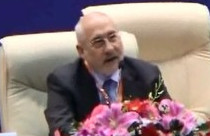Promoting ecological civilization through green development
Author : Source : Chinese Social Sciences Today 2017-11-14
The recent 19th CPC National Congress report called for speeding up systemic reform to develop ecological civilization and build a Beautiful China. According to the report, from 2020 to 2035, China will build upon the foundation created by the moderately prosperous society with a further 15 years of hard work to basically realize socialist modernization. By the end of that period, the goals of effecting a fundamental improvement in the environment and building a Beautiful China are expected to be basically attained. These important statements expound upon the goals and path of developing ecological civilization in China, which is scientific, practical and motivational.
In the past nearly 40 years since the reform and opening up, China has risen to become the world’s second-largest economy and the largest manufacturing giant. However, under the traditional development model, China has also paid a huge price for rapid industrialization and urbanization in terms of resource depletion and environmental degradation. The atmosphere, water and soil have been severely polluted, and the ecosystem has been greatly damaged. To tackle the growing resource and environmental problems, China earlier listed resource conservation and environmental protection as basic national policies. Actively responding to the sustainable development strategy put forward at the United Nations Conference on Environment and Development in 1992, the country formulated the 21st Century Agenda. After the World Summit on Sustainable Development in 2002, China proposed a series of major strategies, such as promoting harmony between humanity and nature. Since the 18th CPC National Congress, China has asserted that clean water and lush mountains are invaluable assets, and ecological civilization has been incorporated into an integrated plan to promote coordinated progress in five spheres: economic, political, cultural, social and ecological. Recently, the 19th CPC National Congress made green development an important part of the Thought on Socialism with Chinese Characteristics for a New Era.
In the past five years, ecological civilization in China has been continuously advancing. Altogether, the country designated 101 national pilot sites for ecological civilization. In addition, a number of pilot sites for the national park system, new urbanization as well as a number of pilot low-carbon, circular economy, sponge and smart cities have also been designated.
According to statistics released by the National Development and Reform Commission, energy consumption per unit of GDP in China from 2013 to 2016 declined by 17.8 percent. During that period, energy consumption grew by an annual rate of 2 percent and underpinned the national economy, which grew by 7.2 percent annually. Clean energy’s contribution to total energy consumption increased from 15.3 percent to 17.7 percent. The acreage of newly planted trees totaled 248,000 square kilometers.
Furthermore, Xiongan New Area was established to facilitate the integration of the Beijing-Tianjin-Hebei region by relocating some of the non-capital functions from Beijing. This offered a model of addressing megacity problems and fighting smog.
China will still face challenges from resource scarcity and environment until 2030, when the country aims to achieve full industrialization and urbanization and the country’s population as well as energy consumption are predicated to reach their peaks.
Therefore, due to its implications for the public’s physical and mental health, advancing ecological civilization has become a major focus of the current stage of China’s modernization. As General Secretary of CPC Central Committee Xi Jinping pointed out in the 19th CPC National Congress report, “We should cherish the environment as we cherish our own lives.” Concretely speaking, the following points are noteworthy:
First of all, the environmental management system needs to be improved by strengthening the overall planning, organization and leadership for managing natural resources and the environment. Also, it is advisable to establish regulatory agencies to manage state-owned natural resource assets and monitor ecosystems. These agencies will, in a unified way, perform the duties of regulating and monitoring the exploitation of natural resources, environmental pollution control and ecosystem restoration.
In addition, leaders must step up efforts to establish a legal and policy framework that promotes green production, consumption and promote a sound economic structure that facilitates green, low-carbon and circular development.
Furthermore, the government should carry out major projects for green development and improve the systems for regeneration of forests, grasslands, croplands, rivers and lakes.
By 2035, we can expect to see the dense haze in the sky disappear, the streams will run clearly again, and the chirping birds and fragrant flowers will surround us once more. Eighteen years from now, those who are children now will inherit a more beautiful China with bluer sky, cleaner water and greener land. By that time, people will be living happy lives under rays of bright sunshine.
Liu Zhiyan is a research fellow from the Institute for Urban and Environmental Studies at the Chinese Academy of Social Sciences and the director of the academy’s Urban Information Integration and Dynamic Simulation Laboratory.
Interview with Wang Gungwu on significance of studying overseas Chinese
Wang Gungwu is a distinguished Australian historian who studies overseas Chinese. He currently works at the Faculty o...
-
On the rat/mouse of the zodiac
2020-02-20
-
Regional development calls for Huaihe culture’s soft power
2020-01-10
-
Archaeological discoveries unveil Maritime Silk Road
2020-01-06
-
China’s industrial art printing
2019-12-10
-
Yue-Gan Ancient Road: A journey into Hakka history
2019-05-13
-
The Lantern Festival in Dream of the Red Chamber
2019-02-18














 2011-2013 by www.cssn.cn. All Rights Reserved
2011-2013 by www.cssn.cn. All Rights Reserved